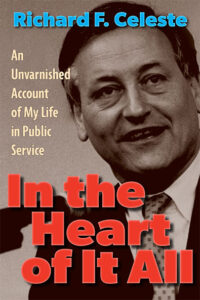Former Peace Corps Director Dick Celeste Writes Memoir
Dick Celeste has released a book In the Heart of It All, An Unvarnished Account of My Life in Public Service published by Kent State University Press
By Sabrina Eaton, cleveland.com
LAKEWOOD, Ohio – Democratic former Ohio Gov. Dick Celeste feels like he’s one of the last people in his family to write a book. His wife, Jacqueline, is already a published author. When Celeste was U.S. ambassador to India, she collaborated with their toddler son, Sam, on a children’s book about a mouse living in the U.S. Embassy.
At age 85, the Lakewood native has released his first book, a memoir titled “In the Heart of It All: An Unvarnished Account of My Life in Public Service,” published by Kent State University Press. It follows his life from his childhood through his university days at Yale and Oxford, covering his Ohio political career, diplomatic service, and presidency of Colorado College. Writing it took roughly 15 years, he reports.
Although Celeste’s home base is currently Colorado Springs, where he serves corporate and charity boards, he’s now in Ohio to promote the book at interviews, readings and book signings.
He says he put the book together “partly for myself, to have a sense of the the journey that I’ve been on,” and also to share some of his stories with the younger generation in a way that encourages them to think seriously about careers in public service.
Here are some takeaways from the 356-page tome:
Guerilla campaign tactics:
Celeste’s dad, Frank, served as Lakewood mayor and ran unsuccessfully in Cleveland’s 1967 mayoral primary, finishing behind Carl Stokes and Ralph Locher. Celeste himself lost his initial run for office as Lakewood High School senior class president, writing: “So much for bright political beginnings.” The classmate who defeated him went onto manage his first campaign for state legislature, which he won in 1970.
Celeste describes a number of guerilla campaign tactics he used to get his name before voters. They included having himself paged at Cleveland Hopkins International Airport and at Browns games. Because the Democratic legislator couldn’t get hearings for his bills in the Republican-controlled legislature, he focused on constituent services and trying to get speaking gigs throughout Ohio to pave the way for an executive branch run.
Upon winning Ohio’s 1974 Lieutenant Governor’s race when Republican Jim Rhodes won the top spot, Rhodes told him to take up golf “because you’re going to have plenty of time. I’m not going to give you a damn thing to do.” Celeste used the time to travel the state to build support to challenge Rhodes.
After losing to Rhodes in the 1978 gubernatorial race, President Jimmy Carter appointed Celeste Peace Corps director. When he returned to Ohio for his successful 1982 gubernatorial run, he says he tried to stand next to Bill Brown, a candidate who was considerably shorter than him, whenever he could.
“I was taking advantage of research showing that voters favor taller candidates over shorter candidates and even that presidents tend to be a good deal taller than the rest of their generation,” he explained.
He says the 20% margin by which he won the governor’s race was “the largest margin achieved by any Ohio Democratic governor in the century.”
Svetlana:
As a student at Yale University, he became a protégé of U.S. Rep. Chester Bowles of Connecticut. When Bowles became ambassador to India in the 1960s, he asked Celeste to accept a position in the embassy. One of his jobs there was to arrange events for celebrity guests who dropped by the embassy, such as Pete Seeger, Duke Ellington, Marlon Brando and even Republican politician Richard Nixon. Celeste spent four days showing Nixon around, and received a thank-you letter from Nixon that encouraged him to think about a public service career.
During his time at the embassy in New Delhi, a woman who claimed to be Soviet political leader Joseph Stalin’s daughter, Svetlana, sought asylum in the United States.
“Her story was hard to believe,” wrote Celeste. “Not only did this woman say she was Stalin’s daughter, she claimed to be the common-law wife of an older Indian gentleman who worked at the Foreign Language Press in Moscow … Her husband had died the previous November. She had promised to bring his ashes from Moscow to immerse them in the Ganges.”
After dispersing his ashes, she wanted asylum. She told them she decided against returning to the Soviet Union after the Russian ambassador to India berated her at a luncheon for refusing to eat ham. He had “launched into a tirade about how she had become an embarrassment to herself, to her family, and especially to the Soviet people.”
Celeste initially worried the woman’s arrival at the embassy was a Soviet effort to embarrass the United States by claiming Stalin’s daughter was kidnapped. Bowles decided to issue her a U.S. visa but “let her know she has got to get on the plane on her own.” She went to Italy and Switzerland before settling in the United States.
Sex addiction:
Celeste’s memoir describes how he could “sleep anywhere” like on airplanes “and usually did.” It also describes him sleeping around in the more colloquial sense. He says he first cheated on his initial wife, Dagmar, less than two years into their marriage, with a friend of Dagmar’s mother, and engaged in extracurriculars throughout their marriage.
“I am not proud of my behavior as a spouse,” he wrote, while declining to get into the “gossipy detail” of his serial infidelities.
His second wife, Jacqueline Lundquist, was among the last of those affairs. After they left their prior spouses for one another, Celeste went to a sex addiction treatment center in Tucson. He subsequently became active in the Sex Addicts Anonymous 12-step program.
“I still go to meetings from time to time and am grateful to be celebrating my twenty-seventh year of sobriety,” he reports.
White House dreams:
Like many Ohio politicians, Celeste envisioned himself seeking the presidency. He says he began to give it “serious consideration” when he traveled to New Hampshire to knock on doors for Sen. John Glenn’s 1984 presidential run. The positive reception he got in Italian-American communities made him think he could gain traction if he ran for national office.
“Ohio is a microcosm of the country, and it remains crucial for any candidate to do well here, “Celeste wrote. “I felt that if I could go up against top candidates here and win, I could go up against them nationally and win. The big difference was scale – the intensity of scrutiny by the press corps and the amount of money required for a winning campaign.”
He arranged a trip to Iowa and began addressing national groups like a United Auto Workers Convention. His aspirations were derailed after a press conference where former Plain Dealer reporter Mary Anne Sharkey asked if he had “a Gary Hart problem” and published a story about his womanizing after Celeste denied it.
“My response should have been “Frankly, Mary Anne, my personal life is just that – personal,” he writes.
Other reasons he decided against running, apart from questions about his personal behavior, included doubts that Ohio’s newspapers and Democratic voters would back his campaign. He said he also didn’t relish “the time, energy and pleading” it would take to raise a presidential war chest and worried that a successful national effort “would come at the expense of my commitment to governing Ohio.”
“It was my own vote I couldn’t get on that,” Celeste said in an interview. “At that point, I needed to work on myself in some way or another.”
Years later, when Ted Strickland asked him for advice on a gubernatorial run, Celeste asked him whether he’d be “ready to eat that chair … The chair is a way of talking about appetite. You have to be that hungry. You have to be ready to give it everything you have. Or don’t enter the race. How hungry are you for the job? The fact was I was not prepared to eat the chair.”
Strickland held the governor’s office from 2006 through 2010, and is the last Democrat to have done so.
India II
Celeste returned to India as U.S. ambassador during Bill Clinton’s presidency. He compared it to “picking up an interrupted conversation.”
“It was almost as if nothing had changed, though of course in the time since Chet Bowles had served as ambassador a great deal had changed,” Celeste writes. “India had grown from a population of four hundred million to one billion. No longer governed by a single dominant party, India was led by a coalition government. And the world, too, was a vastly different place than it was when Svetlana sought a new life in that embassy.”
This time around, the issues he dealt with included a border dispute between India and Pakistan, and sanctioning India after it tested nuclear weapons. His visitors at the embassy included Richard Gere, Arlo Guthrie and President Clinton. He reports that most Indians and virtually all of the diplomatic corps couldn’t understand why the Monica Lewinsky affair became fodder for impeachment and wasn’t a purely personal matter.
He says Calcutta was his favorite consulate to visit. He delivered a speech to its joint assembly that compared the city to Cleveland because both are industrial cities with a prosperous past and great cultural attractions.
The leaders of the West Bengal State Assembly’s upper and lower chambers, who sat on each side of him, told him they both have brothers who live in the Cleveland area, whom they visit every year.
“Can the world get any smaller?” Celeste asked.
In the Heart of it All recounts Celeste’s childhood in Lakewood, Ohio, where his politically ambitious father eventually served as mayor. Awarded a scholarship to attend Yale University, Celeste studied history and later became a Rhodes Scholar at Oxford; while living overseas, he met and quickly married his first wife, Dagmar Braun. Upon returning from Oxford, Celeste expected to begin a teaching career but was recruited to serve as a liaison for Peace Corps volunteers in Latin America, and the young couple relocated to Washington, DC, where they became friendly with Chet and Steb Bowles. When President Kennedy appointed Chet Bowles US ambassador to India, he invited Dick to work as his personal assistant. There, under Bowles’s tutelage, Dick began to consider a political career of his own.
Celeste returned to Ohio and successfully ran for the Ohio House of Representatives as a Democrat in 1970. After serving two terms, he was elected lieutenant governor in 1974 but lost the 1978 governor’s race by a slim margin. Celeste worked in DC as director of the Peace Corps while plotting his next move, and in 1982, his gubernatorial campaign resulted in a landslide victory. He served two terms as Ohio’s governor, tackling an epic savings and loan crisis along with mental health reform and job creation.
Celeste describes candidly why he considered and dismissed a presidential campaign in 1988. He went on to serve as ambassador to India under President Clinton, traveling there with his second wife, Jacqueline Lundquist, and bringing his career full circle. Shortly after that position ended, Celeste became president of Colorado College, serving from 2002 to 2011.
•
 In the Heart of It All:An Unvarnished Account of My Life in Public Service
In the Heart of It All:An Unvarnished Account of My Life in Public Service
by Richard F. Celeste (PC Director 1979-81)
Kent State Publishing
350 pages
November 2022
$ 22.49 (Kindle); $29.95 (Paperback)

No comments yet.
Add your comment